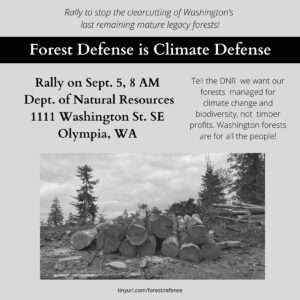[The Pacific Northwest Forest Climate Alliance’s Washington State Lands Working Group (WSLWG) and 18 other groups have released a “Call to Action,” demanding that state leaders pivot towards more ecologically sound forest management, emphasizing such myriad benefits as biodiversity, habitat conservation, water quality and climate protection. See related story on page 8]
On July 21, 2022, the Washington State Supreme Court issued a unanimous ruling in Conservation Northwest v. Commissioner of Public Lands, the “All the People” case. While the Court confirmed the trust mandate under which the Department of Natural Resources (DNR) operates, the Court found that the State has great latitude in how it is carried out. The DNR is under no obligation to maximize revenue from logging, and has multiple ways it can create benefits for beneficiaries and the broader public.
Now that the Court’s ruling has clarified that DNR has great flexibility in how State forests are managed, the Washington State Lands Working Group and the endorsers listed below call for actions to be taken that support rural communities and emphasize forest health, biodiversity and climate protection.
Outlined below are seven specific actions we urge be taken by those who have the discretionary authority to act: the Governor, the Washington State Legislature, the Commissioner of Public Lands (CPL), the Board of Natural Resources (BNR), the Superintendent of Public Instruction, Public University Presidents and Boards of Regents.
Conserve all remaining legacy forests. An immediate moratorium must be imposed on any further commercial harvest of the remaining 80,000 acres (5.3%) of unprotected State–managed legacy forests in Western Washington. These are naturally regenerated, mature (generally pre–1945, and older) forests, which, if left to grow, will become the next generation of old growth. These forests store and sequester carbon at very high rates, function as lifeboats for biodiversity and provide numerous other ecological benefits. These forests, if left intact, will help Washington achieve its 2050 climate goals. The BNR can take this action. The CPL should recommend this be done.
Modernize the Board of Natural Resources for All the People. The Board of Natural Resources must be reconstituted to effectively ensure representation of a broader set of beneficiary and public interests (including tribal interests). The current Board is composed of trust beneficiaries that benefit financially from logging. It will take an act of the Legislature to change the governance model of the BNR.
The Governor, the Commissioner of Public Lands, and the Superintendent of Public Instruction should request this legislation be adopted early in the 2023 session with an emergency clause which would make it effective upon signing. This would allow much needed planning to begin in 2023.
Create an “All the People” Forest Plan—with climate as top priority. The reconstituted BNR must oversee the development of a new Forest Conservation and Management Plan for State Trust Lands that restores forest health, protects biodiversity, and maximizes carbon storage and sequestration. It is critical to focus on this immediately, given the urgency of the climate crisis and the State’s goal to reach net zero carbon emissions by 2050, a goal WA cannot meet unless older forests—the most effective tool for drawing down atmospheric carbon—are safeguarded.
The new Plan should conserve the remaining legacy forests of Western Washington, establish a new Washington State Carbon Reserve System, and accelerate the development of structurally complex forests in areas that lack complexity, or are vulnerable to catastrophic wildfire, disease, or pest infestation. The Plan should be developed in close consultation with independent scientists who are not beholden to the timber industry.
The next decade’s logging plan, known as the “Sustainable Harvest Calculation”, must be based on the principles and priorities of the new Forest Conservation and Management Plan. In the 2023 session, the Legislature should appropriate funding for the Plan including the costs associated with the independent science panel. Implementation must begin in 2024.
Invest in our rural counties. Rural counties that have relied on logging revenues from trust lands for essential public services must no longer be ignored. The State must develop new revenue sources and funding approaches to help fund the important services provided by rural counties and their junior taxing districts (e.g., hospitals and fire). The climate benefits from intact forests accrue to the public broadly, so it is appropriate that the public pay to keep the forests intact. It is also in the broad public interest to address the need for new forms of economic development in many rural communities.
Fortunately, there is abundant skilled work in forest restoration and sustainable harvesting. The Legislature should develop and fund a Rural Community Development Investment Plan. The Governor should work with the rural counties, the Legislature and the Congressional delegation to begin this transition in the 2023 session.
De–link logging and education budgets. In recent decades, logging revenues have constituted a decreasing share of the overall budget for K–12 school construction. Today it is less than 2%. We applaud the Superintendent of Public Instruction for calling on the Legislature to break the remaining tie between logging revenue and school construction budgets.
The Superintendent of Public Instruction should work with the Governor and the Legislature to enact this recommendation in a way that also conserves the legacy forests that are essential to our children’s climate future. Similarly, it is time to end the link between logging and higher education funding. Public universities with trust interests in DNR–managed forest lands should prioritize climate protection and research—not clearcutting. The university presidents and the Boards of Regents, the governing bodies of the public universities, should work with the Governor, the CPL and the Legislature to implement these changes.
Implement practices that improve forest health. For the long–term viability of our state’s forest ecosystems, it is essential that DNR transition away from standard practice industrial logging and move toward an ecologically–based management model that requires harvest rotations of at least 80 years and improves forest health. The BNR can take this action. The CPL should recommend this be done.
Strengthen the Trust Land Transfer tool. As the state transitions to the new forest conservation and management approach, DNR’s Trust Land Transfer (TLT) program can ease the transition for the traditional trust beneficiaries. Trust Land Transfer involves preserving a forest with high conservation value that would otherwise be logged while also compensating the underlying trust.
Since the TLT program was created in 1989, it has been used to conserve over 120,000 acres of forests. DNR let the program lapse in 2020 when they chose not to request further appropriations. Fortunately, the program is now being revitalized with extensive stakeholder engagement. The CPL should work with the Governor to make a robust funding request to the 2023 Legislature.
These are some of the important steps that need to be taken to reform Washington State forest policy and practice so that it works for trust beneficiaries and for “All the People.” We stand ready to work together for the enactment of these changes and to offer strong support to the elected and appointed leaders who will do the same.
Washington State Lands Working Group
Pacific Northwest Forest Climate Alliance
Signatories:


Be First to Comment